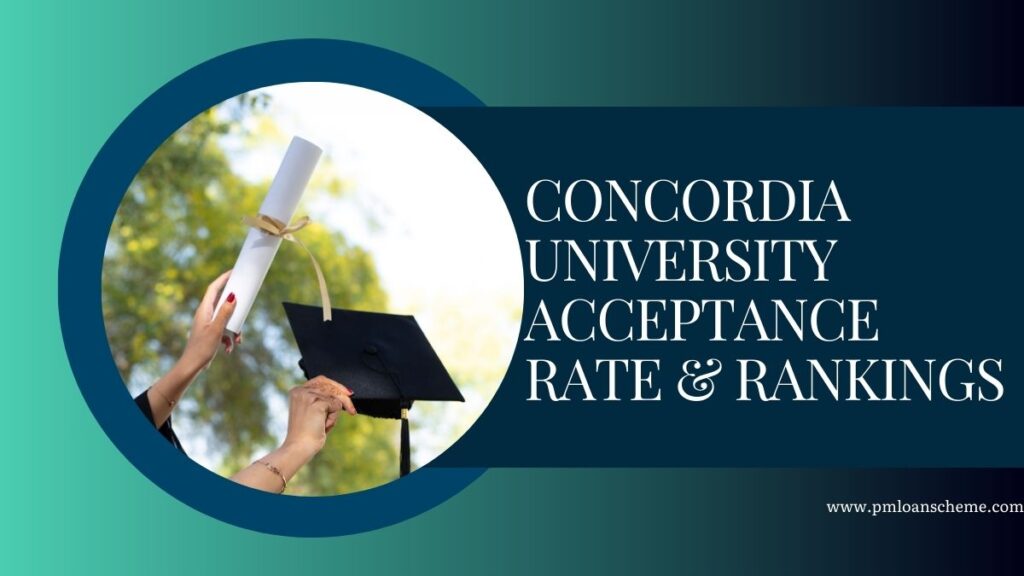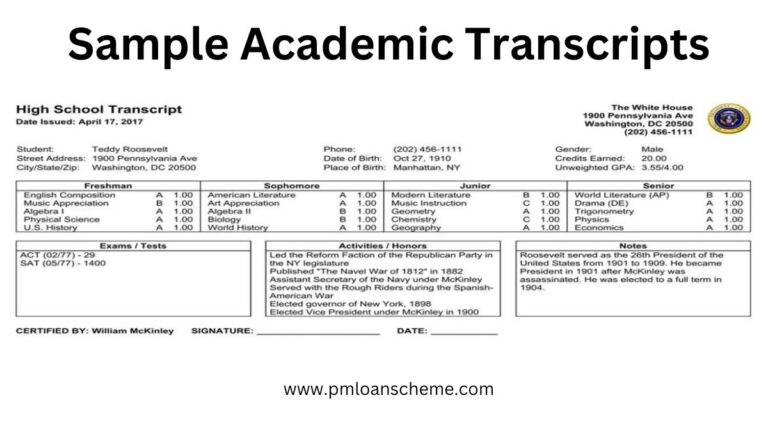Concordia University: Acceptance Rate, Ranking, Fee: Concordia University, a respected public research institution in Montreal, Quebec, was founded in 1974 and is known for its strong academic programs. It offers a variety of undergraduate and graduate liberal arts programs, with an acceptance rate of 71% and an employment rate of 92% for graduates within two years. Tuition for on-campus students is approximately $50,000 annually.
In the 2022-2023 academic year, Concordia enrolled 49,898 students, including 35,404 undergraduates and 10,084 graduate students, with 24% of the student body coming from over 150 countries.

Concordia University Rankings
Concordia University consistently ranks within the top 500 in international standings, reflecting its strong global and national reputation. In recent years, it has ranked as follows:
| Ranking Agency | 2022 | 2023 | 2024 |
|---|---|---|---|
| QS World University Ranking | #501-550 | #551 | #387 |
| Times Higher Education | #601 | #601 | #501 |
| US News and World Report Ranking | #657 | #653 | #665 |
Concordia University Acceptance Rate 2025
Concordia University has an average acceptance rate of 78%.
Concordia University Courses and Fee
Concordia University offers over 140 undergraduate and graduate programs, each with specific eligibility requirements and unique features. Below are some of the most popular programs among international students, along with their annual tuition fees and application deadlines.
| Program | Annual Tuition Fee | Application Deadline |
|---|---|---|
| Master’s in Applied Computer Science | CAD 18,363 | February 1, 2025 |
| MEng in Electrical and Computer Engineering | CAD 18,363 | February 1, 2025 |
| MEng in Information Systems Security | CAD 18,363 | February 1, 2025 |
| MEng in Software Engineering | CAD 18,363 | February 1, 2025 |
| MASc in Mechanical Engineering | CAD 17,288 | February 1, 2025 |
Concordia University Placements and Jobs
Concordia University equips students with valuable career skills and connections through its Career Services Center, which offers resources like resumé assistance, mock interviews, and career fairs to prepare students for the job market. Graduates from Concordia often find employment in fields such as education, business, healthcare, and public service.
| Degree | Average Annual Salary (CAD) | Average Annual Salary (INR) |
|---|---|---|
| MBA | CAD 98,051 | INR 6,018,937 |
| MSCM | CAD 90,000 | INR 5,524,720 |
| PhD | CAD 80,667 | INR 4,951,806 |
| MSc | CAD 71,116 | INR 4,365,511 |
| MBA with CFA | CAD 90,285 | INR 5,542,215 |
Internship programs and cooperative education options enhance students’ professional networks, increasing their job prospects. The university’s strong alumni network and partnerships with local businesses further boost employment opportunities after graduation.
Is Concordia University Good ?
Concordia University boasts a highly diverse student population, with a significant number of international students contributing to its vibrant campus community. The university maintains a balanced male-to-female enrollment ratio of 1:1 and a student-to-faculty ratio of 30:1, supporting both gender equality and accessible faculty engagement.
Concordia University Campus
Concordia University provides students with a modern and well-equipped campus infrastructure across two primary locations in Montreal: the Sir George Williams Campus and the Loyola Campus. Both campuses feature advanced research labs, extensive libraries, and purpose-built classrooms designed to support a wide range of academic programs. In addition, students have access to recreational facilities, student lounges, and multiple dining options, creating a dynamic and supportive environment.
Key buildings like the John Molson School of Business and the Engineering, Computer Science, and Visual Arts Integrated Complex (EV Building) on the Sir George Williams Campus stand out for their cutting-edge facilities, which emphasize Concordia’s commitment to sustainability and innovation.
Campus Highlights
| Feature | Description |
|---|---|
| Sir George Williams Campus | Located in downtown Montreal, known for its urban environment and high-tech facilities. |
| Loyola Campus | Situated in a more suburban area, providing a quieter environment with a mix of green spaces and traditional architecture. |
| John Molson School of Business | Advanced facilities including trading rooms and entrepreneurship labs. |
| EV Building | Houses labs and workshops for engineering, computer science, and visual arts, built with sustainable design principles. |
| Libraries | Extensive digital and physical resources, with dedicated study areas and group workspaces. |
| Recreational Facilities | Gyms, sports courts, and fitness centers available for students’ physical and mental well-being. |
Concordia’s infrastructure is thoughtfully designed to support students academically, socially, and professionally, enhancing the overall university experience.
Here’s a comparison of Concordia University with some of its top competitors in Canada, focusing on the QS World University Ranking for 2025, acceptance rates, and approximate annual tuition fees for international undergraduate students.
Comparison of Concordia University and Competitors
| University | QS World Ranking 2025 | Acceptance Rate | Annual Tuition Fee (International, CAD) |
|---|---|---|---|
| University of Toronto | #21 | 43% | CAD 60,000 – 70,000 |
| University of British Columbia | #34 | 52% | CAD 55,000 – 60,000 |
| McGill University | #30 | 46% | CAD 40,000 – 55,000 |
| University of Alberta | #111 | 58% | CAD 30,000 – 40,000 |
| Concordia University | #387 | 71% | CAD 18,000 – 50,000 |
| University of Ottawa | #279 | 73% | CAD 32,000 – 45,000 |
| Simon Fraser University | #328 | 59% | CAD 30,000 – 40,000 |
Concordia University Acceptance Rate & Annual Tuition
- Ranking: Concordia University ranks lower globally compared to major Canadian institutions like the University of Toronto and McGill University, which are among the top 50 in the QS rankings.
- Acceptance Rate: Concordia has a relatively high acceptance rate (71%), which makes it more accessible than some other institutions, such as the University of Toronto, which has a more selective admission process.
- Annual Tuition Fees: Concordia’s tuition fees for international students are relatively affordable, particularly in comparison with universities like the University of Toronto and UBC. This affordability, along with a strong academic infrastructure, makes Concordia an attractive option for international students.
Concordia stands out for its diverse student population, affordability, and access to high-quality educational facilities, making it a competitive choice for students seeking a blend of academic and cultural experiences.
Here are six frequently asked questions about Concordia University:
What is the acceptance rate at Concordia University?
Concordia University has an average acceptance rate of approximately 78%, making it a moderately selective institution.
What programs is Concordia University known for?
Concordia is well-regarded for its programs in business (John Molson School of Business), engineering, computer science, and the fine arts. These programs are particularly popular among both domestic and international students.
What is the tuition cost for international students?
For international students, annual tuition fees vary by program, typically ranging from CAD 18,000 to CAD 50,000, with more specialized programs, such as engineering and business, often at the higher end of the spectrum.
How diverse is the student body at Concordia University?
Concordia has a highly diverse student population, with around 24% of its students being international, representing over 150 countries. This diversity is reflected in its vibrant campus culture.
What campus facilities are available at Concordia?
Concordia University has two campuses (Sir George Williams and Loyola) that offer modern facilities including research labs, libraries, recreational centers, dining areas, and student lounges. The campuses are designed to support a variety of academic and extracurricular activities.
What are the career prospects for Concordia graduates?
Concordia graduates have strong career prospects, with 92% finding employment within two years of graduation. The university offers career support services such as job fairs, resumé workshops, and networking events to help students transition into the workforce successfully.


